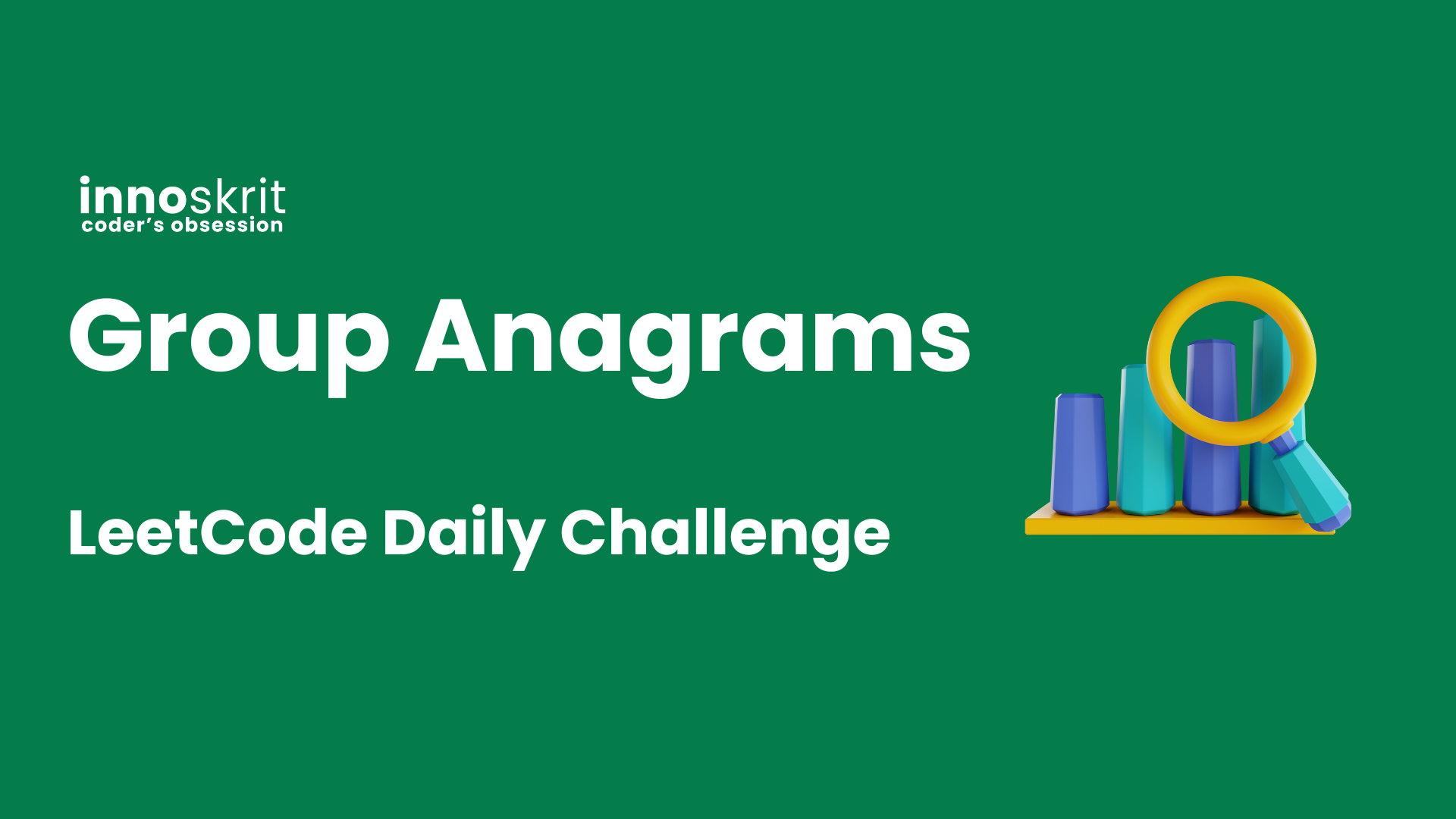Problem Statement
Given an array of strings strs, group the anagrams together. You can return the answer in any order.
An Anagram is a word or phrase formed by rearranging the letters of a different word or phrase, typically using all the original letters exactly once.
Example 1
Input: strs = ["eat","tea","tan","ate","nat","bat"]
Output: [["bat"],["nat","tan"],["ate","eat","tea"]]
Example 2
Input: strs = ["a"]
Output: [["a"]]
Try here before watching the video.
Video Solution
Approach 1 - Categorize by Sorted String
Java Code
class Solution {
public List<List<String>> groupAnagrams(String[] strs) {
HashMap<String, List<String>> anagrams = new HashMap<>();
for(String s : strs) {
char c[] = s.toCharArray();
Arrays.sort(c);
String key = String.valueOf(c);
if(!anagrams.containsKey(key)) {
anagrams.put(key, new ArrayList<>());
}
anagrams.get(key).add(s);
}
return new ArrayList(anagrams.values());
}
}
C++ Code
class Solution {
public:
vector<vector<string>> groupAnagrams(vector<string>& strs) {
unordered_map<string, vector<string>> anagrams;
for (const auto& s : strs) {
string key = s;
sort(key.begin(), key.end());
anagrams[key].push_back(s);
}
vector<vector<string>> result;
for (const auto& entry : anagrams) {
result.push_back(entry.second);
}
return result;
}
};
Python Code
class Solution:
def groupAnagrams(self, strs: List[str]) -> List[List[str]]:
anagrams = {}
for s in strs:
key = ''.join(sorted(s))
if key not in anagrams:
anagrams[key] = []
anagrams[key].append(s)
return list(anagrams.values())
Javascript Code
var groupAnagrams = function(strs) {
const anagrams = new Map();
for (const s of strs) {
const key = [...s].sort().join('');
if (!anagrams.has(key)) {
anagrams.set(key, []);
}
anagrams.get(key).push(s);
}
return Array.from(anagrams.values());
};
Go Code
func groupAnagrams(strs []string) [][]string {
anagrams := make(map[string][]string)
for _, s := range strs {
key := sortString(s)
anagrams[key] = append(anagrams[key], s)
}
result := make([][]string, 0, len(anagrams))
for _, group := range anagrams {
result = append(result, group)
}
return result
}
func sortString(s string) string {
str := []byte(s)
sort.Slice(str, func(i, j int) bool {
return str[i] < str[j]
})
return string(str)
}
Complexity Analysis
- Time Complexity: O(N * K logK), where N is the length of
strs, and K is the maximum length of a string instrs. The outer loop has complexity O(N) as we iterate through each string. Then, we sort each string in O(KlogK) time. - Space Complexity: O(N * K), the total information content stored in
anagrams.
Approach 2 - Categorize by Count
Java Code
class Solution {
private String generateKey(String str) {
int[] count = new int[26];
for (char ch : str.toCharArray()) {
count[ch - 'a'] += 1;
}
StringBuilder sb = new StringBuilder("");
for (int i = 0; i < 26; i++) {
sb.append('#');
sb.append(count[i]);
}
return sb.toString();
}
public List<List<String>> groupAnagrams(String[] strs) {
HashMap<String, List<String>> anagrams = new HashMap<>();
for(int i = 0; i < strs.length; i++) {
String key = generateKey(strs[i]);
if(!anagrams.containsKey(key)) {
anagrams.put(key, new ArrayList<>());
}
anagrams.get(key).add(strs[i]);
}
return new ArrayList<>(anagrams.values());
}
}
C++ Code
class Solution {
private:
string generateKey(const string& str) {
vector<int> count(26, 0);
for (char ch : str) {
count[ch - 'a'] += 1;
}
string key = "";
for (int i = 0; i < 26; i++) {
key += '#';
key += to_string(count[i]);
}
return key;
}
public:
vector<vector<string>> groupAnagrams(vector<string>& strs) {
unordered_map<string, vector<string>> anagrams;
for (const string& s : strs) {
string key = generateKey(s);
if (anagrams.find(key) == anagrams.end()) {
anagrams[key] = vector<string>();
}
anagrams[key].push_back(s);
}
vector<vector<string>> result;
for (const auto& entry : anagrams) {
result.push_back(entry.second);
}
return result;
}
};
Python Code
class Solution:
def generateKey(self, s: str) -> str:
count = [0] * 26
for ch in s:
count[ord(ch) - ord('a')] += 1
key = '#'.join(['#'.join(map(str, count))])
return key
def groupAnagrams(self, strs: List[str]) -> List[List[str]]:
anagrams = defaultdict(list)
for s in strs:
key = self.generateKey(s)
anagrams[key].append(s)
return list(anagrams.values())
Javascript Code
var groupAnagrams = function(strs) {
const generateKey = (str) => {
const count = Array(26).fill(0);
for (const ch of str) {
count[ch.charCodeAt(0) - 'a'.charCodeAt(0)] += 1;
}
return count.map(num => `#${num}`).join('');
};
const anagrams = new Map();
for (const s of strs) {
const key = generateKey(s);
if (!anagrams.has(key)) {
anagrams.set(key, []);
}
anagrams.get(key).push(s);
}
return Array.from(anagrams.values());
};
Go Code
func generateKey(s string) string {
count := make([]int, 26)
for _, ch := range s {
count[ch-'a'] += 1
}
var builder strings.Builder
builder.WriteByte('#')
for _, num := range count {
builder.WriteString(fmt.Sprintf("#%d", num))
}
return builder.String()
}
func groupAnagrams(strs []string) [][]string {
anagrams := make(map[string][]string)
for _, s := range strs {
key := generateKey(s)
anagrams[key] = append(anagrams[key], s)
}
result := make([][]string, 0, len(anagrams))
for _, group := range anagrams {
result = append(result, group)
}
return result
}
Complexity Analysis
- Time Complexity: O(N * K), where N is the length of
strs, and K is the maximum length of a string instrs. Counting each string is linear in the size of the string, and we count every string. - Space Complexity: O(N * K), the total information content stored in
anagrams.
